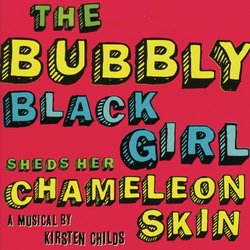The chameleonic LaChanze shines in this bubbly score
Steven Valenti | Cleveland, OH | 04/11/2007
(3 out of 5 stars)
"With "The Bubbly Black Girl Sheds her Chameleon Skin," LaChanze seems to be single handedly taking every musical role that calls for an African-American woman to face adversity and age 30+ years or so over the course of a couple hours. After "Dessa Rose" and her Tony-winning performance in "The Color Purple," she proves again that she can pull this aging trick with aplomb (well actually this show predates the others, it's just the recording that's new). I've said it before-- she's a formidable singer-actress.
What's different about this show, with its autobiographical touches by composer-lyricist Kirsten Childs, is that the adversity here does not involve slavery, poverty, or abuse, but rather the difficulties faced by middle class black women finding their way in a world where accusations of "acting white" leave lasting scars as they struggle to find an authentic self. It's refreshing to have this point of view portrayed-- and Childs's music is original and catchy. It shifts skillfully in different ways-- from a sort of pastiche as the story moves from the 60's to the 90's, to some jazzy moments and a lot of interesting rhythms.
The story basically tells of Viveca "Bubbly" Stanton, who grows up in a middle class family during the civil rights era in L.A. and then goes on to become a dancer in New York. Her sunny personality is challenged by the harsh realities of racism, something she deals with, but refuses to accept. Some of the most insightful songs include the ones that handle this in original ways: The pitter- patter of "Sweet Chitty Chatty," in which Viveca, as a child, asks her (white) talking doll why "men throw bombs at kids like me in churches in Birmingham," The dance rhythms of "The Skate," in which a junior high age Viveca successfully integrates the various ethnicities at her school, and "Brave New World," in which Viveca brings home a white boyfriend to her mother (in a nicely unpredictable touch, Viveca's mom doesn't angrily dismiss the relationship outright, but instead just shares her concerns and tells Viveca she'll be there "to break the fall.").
While the show's musical voice and point of view feel fresh, it relies a little too heavily on choruses-- disembodied voices of nobody in particular. Only Viveca emerges as a true character, but a couple songs for two male love interests--"Beautiful Bright Blue Sky" and "Come With Me"-- are notable, even if they feel a little thankless, rather than moving the plot or defining characters. There is an episodic feel to the songs at times, instead of a continually developing plot, and Viveca's final declaration of "keeping it real" feels a bit forced.
Still, this is a musical recording worth checking out-- Childs obviously infused the show with a lot of her own experiences growing up, and her soul-bearing, along with the estimable LaChanze, make for an undeniably affecting listening experience.
"


 Track Listings (21) - Disc #1
Track Listings (21) - Disc #1